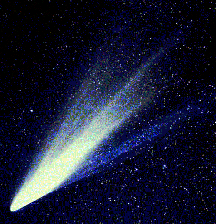A dominant feature of modern geological thought is plate tectonics. Tectonics is (in part) a mechanism for recycling Earth's carbon, which would otherwise have long ago become tied up in, for example, limestone and carbonaceous ocean sediments. A strong case can be made that without tectonics none of us, or even much more basic carbon-based life, would exist on this planet. But there's scant evidence that other worlds have tectonics, or any sense of what brought about the formation of Earth's crustal plates.
| Plate tectonics |
Is the mechanism for the formation of planets, and of planetary systems, any better understood? Not really. And fair enough: until recently, planetologists were extrapolating from a single data point: this solar system. Now that we have a few hundred confirmed solar systems to study -- and more almost every day -- interesting things keep turning up. Such as: "Kronos: The eater of planets. A Sun-like star in our galaxy has likely eaten over a dozen of its rocky inner planets, earning it the nickname Kronos."
(Kronos: Eater of Planets. What a great name that would be for a rock band!)
Comets come from the fringes of our solar system ... right? Well, almost always. But what if gravitational bumper cars should throw a comet entirely out of its native solar system? In theory, it could happen, and the exile make its way to us. And now it seems one such interloper has been spotted. "Astronomers Spot First-Known Interstellar Comet. Telescopes only picked it up a week ago, but it's likely been traveling through interstellar space for millions of years."
I posted not so long ago about the recent detection of gravitational waves from neutron stars colliding ("Wave like a nice black hole ...") -- but there's more to be said about that wonderful event. As in: "Cosmic fireball sheds light on source of gravitational waves. Colliding neutron stars have confirmed theories about gamma-ray bursts and the origin of gold and other heavy elements in the universe." (Is this why gold jewelry is so expensive :-) ?)
For a lengthier, but eminently readable, discussion of the importance of the last-mentioned discovery, check out: "Scientists detect gravitational waves from a new kind of nova, sparking a new era in astronomy."
When the Moon hits your eye ... I have a sudden yearning for pizza.


































No comments:
Post a Comment